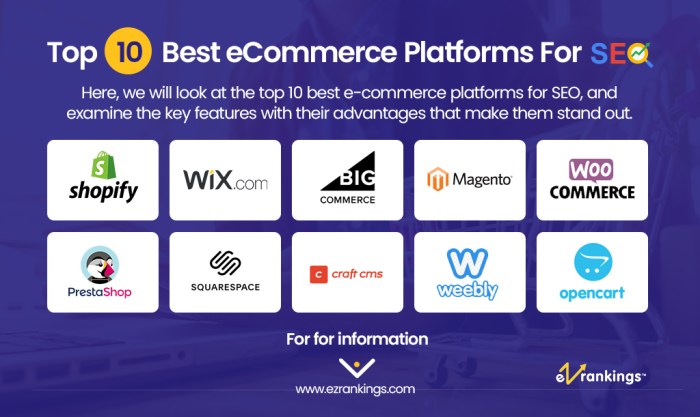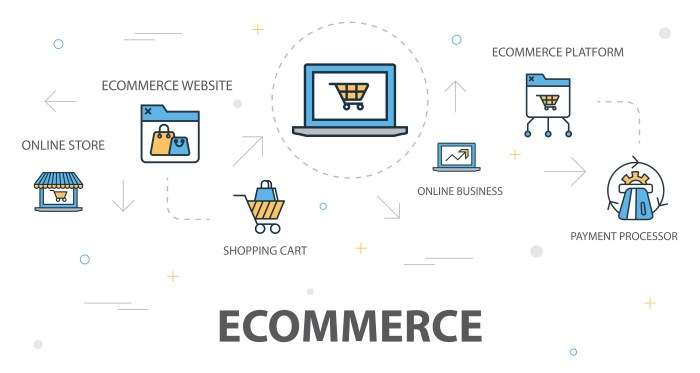E-commerce platforms are the key to unlocking online business potential. From popular examples to essential features, this guide dives deep into everything you need to know.
Exploring the benefits, key features, integrations, and plugins, this comprehensive overview will equip you with the knowledge to thrive in the digital marketplace.
Types of E-commerce Platforms

When it comes to e-commerce platforms, there are several types that cater to different needs and preferences of businesses and consumers. Let’s explore some of the popular ones and compare their key features.
1. Hosted E-commerce Platforms
Hosted e-commerce platforms are fully managed solutions where the provider takes care of hosting, security, and maintenance. Examples of popular hosted e-commerce platforms include Shopify, BigCommerce, and Squarespace. These platforms are user-friendly, offer a variety of templates, and come with integrated payment gateways for easy transactions.
2. Self-Hosted E-commerce Platforms
Self-hosted e-commerce platforms give businesses more control over customization and scalability. Examples of self-hosted platforms include WooCommerce (WordPress plugin), Magento, and OpenCart. While these platforms require more technical expertise to set up and maintain, they offer flexibility and unlimited product listings.
3. Marketplaces
Marketplaces like Amazon, eBay, and Etsy bring together buyers and sellers on a single platform. These platforms handle payment processing, customer service, and product listings. Businesses can leverage the existing customer base of these marketplaces to reach a wider audience and increase sales.
4. Social Media E-commerce Platforms
Social media platforms like Facebook, Instagram, and Pinterest have integrated e-commerce features that allow businesses to sell products directly to their followers. These platforms make it easy for businesses to showcase products, engage with customers, and drive sales through social media marketing strategies.
Benefits of using e-commerce platforms
E-commerce platforms offer a wide range of benefits for businesses looking to sell their products online. From reaching a larger audience to streamlining the buying process, these platforms have revolutionized the way companies do business in the digital age.
Wider Audience Reach
- By utilizing e-commerce platforms, businesses can reach a global audience without the limitations of a physical store.
- With the ability to target specific demographics and markets, companies can expand their reach beyond traditional boundaries.
- Online marketing tools provided by e-commerce platforms enable businesses to promote their products to a larger audience efficiently.
Streamlined Buying Process
- Customers can easily browse through products, compare prices, and make purchases with just a few clicks on e-commerce platforms.
- Payment processing systems integrated into these platforms offer secure and convenient transactions for customers.
- Order tracking, shipping options, and customer support features on e-commerce platforms enhance the overall shopping experience for buyers.
Key features to look for in e-commerce platforms

When choosing an e-commerce platform, it’s crucial to consider key features that can impact the success of your online business. Features such as mobile responsiveness, optimization, secure payment gateways, user-friendly interfaces, scalability, and customization options play a significant role in the overall performance and user experience of your e-commerce website.
Mobile Responsiveness
Mobile responsiveness is essential for e-commerce platforms as more and more consumers are shopping on their mobile devices. A responsive design ensures that your website looks and functions well on smartphones and tablets, providing a seamless shopping experience for users on any device.
Optimization
optimization is crucial for driving organic traffic to your e-commerce website. Look for platforms that offer built-in tools, such as customizable meta tags, sitemaps, and clean URLs, to help improve your website’s visibility in search engine results.
Secure Payment Gateways
Secure payment gateways are a must-have feature for e-commerce platforms to ensure the safety of online transactions. Choose a platform that supports multiple payment options and complies with industry-standard security protocols to protect your customers’ sensitive information.
User-Friendly Interfaces
User-friendly interfaces are essential for providing a seamless shopping experience for your customers. Look for platforms with intuitive navigation, clear product categorization, and easy checkout processes to enhance user satisfaction and encourage repeat purchases.
Scalability and Customization Options
Scalability and customization options are important for e-commerce platforms to accommodate the growth of your business and adapt to changing market trends. Choose a platform that allows you to easily scale your website as your business expands and offers customization options to tailor the design and functionality to your specific needs.
Integrations and plugins for e-commerce platforms
When it comes to enhancing e-commerce platforms, integrations and plugins play a crucial role in expanding functionality and improving user experience. By seamlessly integrating third-party tools and services, e-commerce platforms can offer additional features and capabilities that cater to specific business needs.
Popular Integrations and Plugins, E-commerce platforms
- Payment Gateways: Integrating popular payment gateways like PayPal, Stripe, and Square allows for secure online transactions.
- Shipping and Fulfillment: Plugins like ShipStation and Easyship help streamline shipping processes and provide real-time shipping rates.
- Marketing Tools: Integrating with email marketing platforms like Mailchimp and social media plugins can help boost customer engagement and retention.
- Analytics and Reporting: Plugins such as Google Analytics and Hotjar provide valuable insights into customer behavior and website performance.
How Integrations Improve Functionality and User Experience
Integrations not only enhance the overall functionality of e-commerce platforms but also contribute to a seamless user experience. By incorporating integrations, businesses can automate tasks, personalize customer interactions, and optimize processes, leading to increased efficiency and satisfaction.
Choosing the Right Integrations
- Identify Specific Needs: Determine the key areas where integrations can fill gaps or improve operations within your e-commerce platform.
- Compatibility: Ensure that the integrations you choose are compatible with your e-commerce platform to avoid any technical issues.
- User Reviews: Research and read user reviews to understand the effectiveness and reliability of different integrations before making a decision.
- Scalability: Select integrations that can scale with your business as it grows to avoid the need for constant changes or updates.